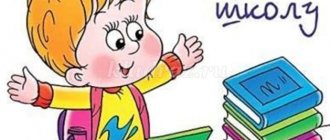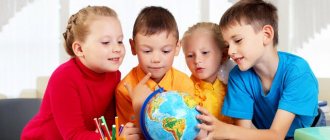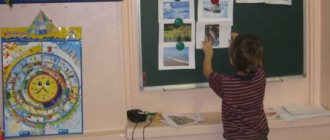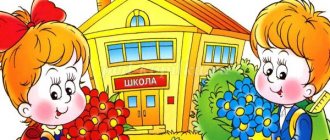In recent days, I have received many questions about our new notes and therefore I decided to tell you more about them. In addition, in this article you will find links to 12 full lesson notes on early development, English, school preparation, entertaining geography, a “science laboratory”, as well as for a children’s art studio and an acting studio.
Notes on developmental activities in English for 4-6 years old
Have you already experienced how difficult it is to find a good English teacher? Even from their student days, beginning “Englishmen” (if they have at least some teaching spark) acquire private practice. They are either not eager to find a job in a children's center, or they are asking for too high a salary.
Another problem is that many young teachers “tutor” quite well, that is, they conduct individual lessons. They are used to starting from the level of one particular student and adapting to him. But they have no idea what to do with a group when they need to hold the attention of several children at once, whose levels may vary slightly. It often turns out like this: a teacher is working with one child, while the rest are bored or, conversely, “standing on their ears.” Even if children are recruited into such groups, they do not stay for long.
Therefore, I organized the creation of notes for beginning English teachers and teachers without experience working in groups.
What can you say about these notes? Our experience in conducting English classes (since 2008) shows that it is very important for parents that classes are conducted not according to an artisanal (as they believe) home-grown methodology created by domestic craftsmen, but according to a respectable British or American method.
On the other hand, a textbook alone is absolutely not enough to conduct 50-minute lessons (as a rule, a textbook lesson is designed for 20-30 minutes). Even with the help of the Teacher's Guide (teacher's manual), the lessons are not rich and interesting enough.
That's why we decided to write notes. The textbook from the respected Longman publishing house – Wonderland Pre-Junior and its CDs were taken as a basis. An experienced teacher-methodologist supplemented it with a detailed description - how the teacher meets children, what games are used when greeting and for “warming up”, what creative and developmental tasks we perform during the lesson, additional vocabulary is given. Along with the notes, you will receive the author's applications for carrying out the exercises. Exercises from the textbook are approximately 10-15% of the lesson.
That is, using notes, you conduct not just English classes, but a comprehensive developmental lesson in English - with exercises for attention, memory, thinking, fine motor skills, with musical pauses and creative work.
This course was compiled by a teacher-methodologist with 13 years of experience working with preschool children. Therefore, the notes provide for situations when children do not want to complete this or that task, when children become bored and what needs to be done to prevent the lesson from being disrupted. In such cases, the teacher has a whole arsenal of games presented in the notes; he can quickly replace the task with another, without giving the slightest opportunity for the children to lose interest in the lesson. Also, notes provide for frequent changes in types of activities, which helps maintain the constant interest of children and prevents them from getting tired of the lesson.
Another advantage of the finished course is its applications. The teacher is freed from searching and constantly copying various books; everything necessary is already included in each lesson. The teacher can only prepare the necessary toys and make games for children from the proposed applications.
I repeat that the lesson taught using these notes is not just an English lesson, but a developmental lesson in English. This can become a competitive advantage that will distinguish your course and your club from competitors.
View an example of a summary in English →
In addition to our notes, for conducting classes you will also need:
- Textbook Wonderland: Pre-Junior: Pupil's Book (preferably for each student)
- One CD of English Adventure Starter A Songs for use in the classroom
- Super Simple Songs.
Developers by age
The long-term practice of Montessori teachers shows how effective educational toys are for the overall development of children, starting from a very early age. We will give only certain types of developmental classes conducted in different age groups. It should be noted that in addition to special didactic materials, the simplest household items serve as game elements: cereals, buttons, jars, boxes, and for home activities, it will not be difficult for parents to prepare such material themselves.
From 1 year to 2 years
At this age, a child is interested in everything. The world is being actively explored; the baby needs to touch and taste everything. He enthusiastically plunges into his activities and does them with pleasure. It is important that developmental toys help develop concentration, fine motor skills, and coordination of movements. These activities include:
Drawing on small grains. Semolina or other small grain becomes a “sheet of paper”. You can draw on it with your fingers, leave fingerprints, handprints. Fine motor skills are most actively involved here, which activates several areas of the brain at once, including those responsible for speech development. In addition, the fingertips and the surface of the palm are gently massaged. You can draw with a brush, stick, or other objects, which allows you to develop not only fine motor skills, but also creative imagination.
Sorting, arranging small items into cups, jars, bottles. For this, buttons, beans or, for example, pieces of a mosaic will be useful. And again, fine motor skills actively manifest themselves here, logical thinking develops, and the child learns concentration. You just need to carefully monitor the process - at this age the baby is interested in tasting everything.
In addition, in this age range a child can learn:
- hold the spoon correctly;
- pour water from vessel to vessel;
- close and open zippers, buckles, Velcro, buttons;
- and many many others!
Developmental activities for 2 - 3 years
Around the age of three, the baby enters the peak sensitive period of sensory development. All five senses absorb information from the surrounding world like a sponge. He no longer just wants to touch the object, but also to understand its “filling”: how the latch works, how the lock opens or the clasp unlaces. But many objects can pose a risk of injury. The solution was found by Maria Montessori herself back in 1907: it was she who invented the first busy board - a “smart board”, on which all sorts of useful things interesting for the baby are collected. You can touch, press, twist, and check “how it works” without fear. By mastering new material with interest, the child perfectly develops fine motor skills and learns to logically comprehend the interconnection of processes. A water tap, a clock face, a compass, a telephone dial, switch buttons - the list of items goes on and on.
Parents can make such a board themselves. You just need to exclude the presence of piercing, sharp, cutting objects and take into account the fact that a “smart board” is being made for a boy or girl.
You can also continue, but in a more complicated form, activities with transfusions, pouring and sorting small items, with clothespins and other materials.
Developmental activities for 3 - 4 years old
The child becomes more independent, and his vocabulary is actively expanded. Important points that need to be emphasized are exercises from practical life, classes on speech development, and preparing the hand for writing.
- Practical life exercises (cleaning, watering flowers, cleaning clothes) help the baby feel independent and self-reliant.
- Further development of fine motor skills to prepare the hand for writing. Exercises for opening and closing all kinds of locks, for pouring, sorting small objects are gradually becoming more complex, and classes are carried out on cutting, embroidering, and shading surfaces.
- Speech skills are intensively mastered. The child studies with interest with cards to enrich his vocabulary, participates in games to develop phonemic hearing and articulation, and memorizes poems, tongue twisters, and nursery rhymes.
Developmental activities for 4 - 6 years old
At this age, the basic skills from practical life have already been mastered. From the age of 4, the child begins to show an active interest in counting, as well as in written and oral native speech. Activities such as:
- writing on semolina or sand - this makes it easier and more interesting to improve in writing your first letters;
- composing simple words using the movable alphabet;
- using rough letters to name sounds;
- writing on a blackboard with chalk;
- shading frames to reinforce skills.
Reading. In accordance with the Montessori method, teachers turn to it only after making sure that the child has mastered the sound designation of letters and can form simple words from the alphabet. Your child will be interested in activities such as:
- phonemic games with naming the first letter with which the object begins;
- naming signatures on cards with various pictures and boxes with figures;
- reading simple tasks and completing them;
- reading simple books, including homemade books.
The child will also take with interest lessons with abacus, which will gradually become more complex by the age of six. During the same period, he actively mastered various creative techniques - in accordance with the Montessori method, the emphasis is not on the images created, but on the techniques, variety of materials and tools used. And, of course, the world around us is being studied more and more actively: maps and images by category (animals, countries, cities, etc.) are used in the space zone; all kinds of experiments that allow us to visually comprehend various phenomena are of great interest. Children who have already mastered writing skills can write down the results of their observations or experiments.
Acting notes
Many of us know how shyness and lack of self-confidence can bring internal suffering and objectively interfere with success in school, in a career, in communicating with friends and in our personal lives.
Achievements in study and work largely depend on the ability to present oneself in a favorable light, win over interlocutors, speak clearly and expressively, and speak in front of a large audience.
And in relationships with loved ones and friends, it is very important to be able to listen and hear, to convey your thoughts and emotions.
Children learn all this in the theater studio. These activities help children “open up”, live in harmony with themselves and be happy.
An example of a summary here →
Notes on preparing for school for ages 6-7 years for reading children
The second year of teaching children under the “Preparing for School” program is designed for children who came to your classes at the age of 5-6 years, and are now ready to continue their education at another level of preparation for school, age 6-7 years.
Practice shows that at this stage of education new children will definitely appear who have already reached the age of 6-7 years and want to attend a school preparation course in your children's club. Many of them may not be able to read and have minimal knowledge of mathematics.
When planning classes, this fact must be taken into account, because all children will have to study together, in one group. As our teachers note, this has benefits for everyone, both new children and those who already attended your classes last year. New children acquire new knowledge and learning skills, while “old” children consolidate and improve their skills.
This year, a lot of work is planned on the phonetic side of the Russian language, much attention is paid to sound-letter analysis and synthesis. Children learn to distinguish vowel sounds from consonants, to give a detailed description of sounds ([z] - consonant, paired hard (soft), paired voiced; [a] - vowel, unstressed (stressed)).
Such concepts as stress, stressed-unstressed syllable are introduced. The ability to determine the number of syllables by the number of vowels is being developed. The simplest concepts of parts of speech are given, work is being done on sentences, the ability to compose stories from pictures, and retelling.
To strengthen reading skills, it is recommended to read short texts and stories, with mandatory analysis of reading comprehension, answers to questions and retellings.
In the “Mathematics” course, work continues on the numbers of the first ten, the ability to write numbers and mathematical signs is consolidated, the skills of oral and written calculations are improved, the composition of numbers, comparisons of numbers, the ability to solve problems and write down its solution are worked out, the structure of the problem is worked out, work is underway on geometric material, tasks for the development of logic and thinking are selected.
Children get acquainted with the formation of numbers of the second ten, Roman numerals. The concepts of kilogram, gram, centimeter, the concept of angles, etc. are introduced. The skills to draw and measure segments, the ability to distinguish them from a straight line, a ray are formed.
IMPORTANT! One more organizational point. Some clubs for the “School Preparation” course prefer to use handout sheets printed on the club printer. Others use ready-made textbooks and copybooks. We belong to the latter group, since we considered that printing black and white sheets, and even more so color pictures, in the club throughout the year is much more expensive than a one-time purchase of copybooks. However, work is now underway to draw special worksheets for these notes. And when this work is completed, we will offer all owners of the notes and our illustrations. You will be able to choose whether to work according to the instructions we provide or print out handout sheets developed by our methodologists for each lesson.
View an example of a school preparation plan for 6-7 years old →
Themed weeks and activities for kids.
Dear friends!
I bring to your attention ready-made activities for your child. You no longer need to sit on the Internet all night long, trying to create an activity for your child, select materials, or come up with a lesson plan. All this has already been done!
I want to offer you ready-made weeks for babies:
Weeks:
“Wheels” - a week for children from 1.2 to 1.9. Includes 4 game days:
- cars. Consider the wheels of a vehicle.
- what else is driving? Let's look at the wheels of other vehicles.
- amazing wheels
- play the fairy tale “Different Wheels”
The week introduces circles in a playful way and teaches them to notice round-shaped objects in the world around them. You'll be surprised how many there are!
Cost - 100 rubles.
"Insects" -
I will recommend this summer week to everyone (
1.3-1.10
). Only 4 days:
- day of flight of butterflies
- day of buzzing bees
- where is the ant in a hurry?
- ladybug
An exciting insect game and lots of ideas for creativity, motor skills and more await you. Cost - 100 rubles.
“Battle of Fairy Tales” - for children from 1.1 to 1.10 years old.
I bring to your attention two fairy tales. It is advisable to spend two days on each fairy tale.
Fairy tale 1. Chicken Ryaba.
Once upon a time there lived a grandfather and a woman... Everyone knows it. Let's play a fairy tale, talk about the chicken, about the eggs. And the grandfather and woman will have their own poultry yard. Who lives there? We will learn from games and creativity in this block of lessons.
Tale 2. Kolobok
The woman baked a bun. Yes, she didn’t just bake it, but scraped it across the box, swept it along the bottom, scraped together two handfuls of flour and fried it in oil.
And the Russian stove probably came in handy for her! Shall we play?
And the bun ran off into the forest. Shall we catch up? Shall we return home?
There are only 4 game days in a week! Cost - 80 rubles.
"My favorite nursery rhymes"
— a super-playful week for children from 1 year old. up to 1 year 8 months The week includes four game days based on famous nursery rhymes:
- Kitten-cat;
-Magpie-crow;
- We drove and drove into the forest for nuts;
- Little bunny, dance.
We will play a lot of role-playing games, engage in creativity, and develop fine motor skills.
The cost of a week is 100 rubles.
"Who builds what" -
construction and play week for kids from 1.2 to 1.8 years old. We will build, we will find out what people, animals, birds build. The week includes four game days:
— people build houses;
— what else are people building;
- what animals build;
- what birds build.
The cost of a week is 100 rubles.
Dishes for the little ones -
A very simple week in content, but mega-useful. Suitable for children up to 1.5 years old. Includes five game days.
The cost of a week is only 50 rubles.
Such colorful fruits
— fruit week for children from 1.3 to 2 years old. We will study fruits and colors. After all, fruits are so different and colorful!
A week includes five days. A week of play and creativity, we develop motor skills, sensory skills, creativity, and intelligence.
The cost of a week is 100 rubles.
WHEN PURCHASING TWO themed weeks, the “Learning Colors” themed week is FREE!
Thematic classes:
I offer themed classes based on books; they are very entertaining and educational. In addition, they greatly contribute to instilling a love of reading and books, develop speech, and increase active and passive vocabulary.
All classes cost 50 rubles.
TK “We are going, we are going, we are going” -
lesson based on the famous poem by Mikhalkov. There was also a wonderful musical cartoon based on it. Lesson for children from 1 to 1.5 years. Of course we play train!
We will touch on creativity, the development of thinking, and motor skills.
TZ "Teremok"
- a lesson based on a famous fairy tale. A very playful and creative activity. The topic of construction is touched upon, we will play with geometric shapes and much, much more. Lesson for children from 1.3 to 2 years old.
TK "Three kittens"
- lesson based on Suteev’s fairy tale. Of course, we will touch on the topic of learning colors, we will mix paints, play kittens and, of course, create! Lesson for children from 1.3 to 2 years.
And finally, I recommend the simply gorgeous “I play with my mom!” set.
How does it differ from thematic weeks and activities? The fact that you choose what activity to do with your child. This is a construction kit, it includes ready-made thematic weeks and activities (attention, it does not duplicate the above!), but only you decide which activity to conduct! Today - you spend a themed week “Transport”, then you see that the child is tired of the weeks. And then you go to the kitchen and do an exciting activity from the “Cooking Together!” project. Or you organize a theater and stage the fairy tale “The Chicken and the Duckling.” Or conduct an interesting Montessori lesson. And then, with renewed vigor, you take on the “Pets” week, etc. Lots of variations!
Here's more information about the kit. Cost - 350 rubles.
There are a lot of kits for ages from 1.5 to 2.5 years. You can see it here.
P/S All kits are in electronic form. Upon request, I send the details by email (you can pay by SB card, phone, Yandex money), BB blocks me for private messages.
Free notes for classes with children in various areas
- Abstract on early development for ages 1-1.5 years
- Abstract on early development for ages 1.5-2 years
- Abstract on early development for ages 2-3 years
- Summary of comprehensive development for ages 3-4 years
- Summary of comprehensive development for ages 4-5 years
- Notes on preparing for school for ages 5-6 years
- Notes on preparing for school for ages 6-7 years
- English language notes for ages 4-6 years
- Abstract on entertaining geography for ages 4-7 years
- Notes on the course “Scientific Laboratory” for ages 5-7 years
- Drawing notes for ages 5-7 years
- Notes for an art studio (batik, iso-modeling, floristry - paper flowers, decoupage, sand painting, cardboard modeling) for ages 4-6 years
- Notes for classes in an acting studio for ages 3-6 years
If you liked any of these notes, you can purchase a complete set from us for the course that interests you.
Early development methods and programs
Nowadays a fairly large number of proprietary programs and techniques are known. But if we talk about early development schools, then the most widely used method is M. Montessori and classes based on the manuals of N. A. Zaitsev.
Waldorf pedagogy
Founder
: Rudolf Steiner, German philosopher and esotericist, developer of the direction of anthroposophy. The first Waldorf school was opened in Germany in 1919, for the children of workers (hence the name of the pedagogy itself).
Basic provisions
: Waldorf pedagogy is initially focused on the child’s personality and consists of developing his natural abilities. Waldorfs believe that childhood is a wonderful age that we should try to extend. Therefore, the main emphasis is on the development of artistic, musical and theatrical abilities. Education is largely based on the principle of imitation and repetition of the teacher. Great importance is attached to the emotional state of the child. But early development of intelligence is considered unacceptable, i.e. learning to read and write here begins extremely late. In a Waldorf kindergarten, much attention is paid to manual labor: all children learn to embroider, cook, carve wood, work on a pottery wheel, and even grow vegetables. The toys here are unusual: most of them are made by children’s hands or are objects made from natural materials, usually unpainted wood or clay, because... This develops the baby's imagination and creativity. Often such groups have their own living corner, where the guys learn to care for our little brothers. Waldorf kindergartens constantly host holidays and stage theatrical performances.
Age
: groups in kindergarten are not divided among themselves by separate ages, but are a mixed, multi-age group from 3 to 6 years. It is not recommended to send your child to kindergarten at an earlier age.
Classes
: modeling, drawing, cooking, music (most often a flute or folk instruments), eurythmy (movements to music), theater, etc.
Methodology of M. Montessori
Founder
: Maria Montessori, Italian teacher; one of the first women to receive a medical degree; Professor of Anthropology and Hygiene at the Women's Higher School. Initially, her classes were designed for children with developmental delays. But the results that the children achieved were so amazing that a reasonable question arose: what would happen to ordinary children if similar classes were carried out with them. And after some time, the first kindergarten for ordinary children was opened.
Basic provisions
: the main principle of Montessori groups is “help me do it myself,” i.e. the initiative for any action should come from the child, and the teacher only helps and guides the child. After all, if we constantly do everything for children (spoon feed, tie shoelaces, etc.), then they themselves will never learn this. For this purpose, Montessori teachers have developed a huge amount of developmental material. All the manuals are beautiful, interesting and pleasant to the touch. They are arranged from simple to complex, from concrete to abstract and are always fully accessible to the children. Thus, the child himself chooses when and what he will do, for how long and with which of the children he will cooperate. M. Montessori substantiated that every child has a need for development, so he himself will always strive for new knowledge. And the developing environment will help him with this. Even M. Montessori drew attention, and modern psychology has confirmed that every child experiences sensitive periods, i.e. those moments of his life when he most easily and naturally learns certain things (for example, the most favorable period for learning to read is from 3 to 5.5 years; and the sensitive period for the perception of order lasts from 2 to 4 years). And if you take into account these features of children’s development, then learning will take place easily and naturally.
Age
: There are classes in “mother + baby” groups, which are attended by parents with children from 1 to 3 years old. And children from 3 to 6 years old are already studying in groups independently.
Classes
: in each Montessori group the learning environment is built in a certain way. With the help of manuals, you can learn many things: pour water from a jug into cups, spoon cereal, read, write, and also study pets and seasons. All material is divided into five zones: practical life; sensory (development of sense organs); mathematics; Russian language; space (knowledge about the surrounding world). In order for the child to work correctly with the new manual, the teacher conducts a presentation of the material, i.e. shows and, if necessary, explains what and how to do. All Montessori materials are designed so that the child can control his own mistakes. The teacher does not need to point out shortcomings in the child’s work, thereby the child does not have a feeling of fear if he has done something wrong, and he is confident in his abilities.
Methodology of N. Zaitsev
Founder
: Nikolay Aleksandrovich Zaitsev - teacher of Russian and English languages, academician of the Academy of Creative Pedagogy, author of new directions in methods of teaching reading, teaching mathematics and grammar.
Basic provisions
: N.A. Zaitsev developed a method for teaching reading using sounding cubes. The technique is based on the principle of warehouse reading. Adults together with children or the children themselves sing songs written on tables or measured on the sides of cubes, which differ in color, size and sound (inside the cubes there are various objects that make sound). By playing with these cubes, children learn to form simple words, write the names of objects; with the help of a pointer they do the same on the tables. And soon they begin to read street signs, magazine titles, and even their first books.
Zaitsev's manuals are good for their combination of clarity and systematic approach; they are specific and comprehensive at the same time. But his method is not only teaching reading, he also developed manuals for learning numbers, there are also “Favorite Pictures”, “Road Signs”, “Read and Sing” (teaching reading through singing), “Thousand +” (teaching mathematical operations , working with the square of a number), “I write beautifully” (learning calligraphy).
Age
: You can start classes on Zaitsev’s cubes at any age. But if we are talking about group classes, then the best age is 4-5 years. On the one hand, the kids have already grown up, they are drawn to other children, it is easier for them to adapt to a new environment, and on the other hand, the children already know what a book is, they understand why they need to learn to read, and they accept the “rules of the game” with pleasure. . Therefore, it is at this age that learning occurs most quickly and easily.
Very often, teachers in early development schools are proficient in several methods and use them in directly teaching children.





